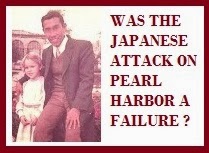
The attack on Pearl Harbor was a surprise military
strike conducted by the Imperial Japanese Navy against the United States naval
base at Pearl Harbor, Hawaii, on the morning of Dec. 7, 1941. The attack led to
the United States entry into World War II.
Motivated by the victorious spirit of Togo, the
Japanese maneuver when attacking Pearl Harbor was conducted by using its utmost
power. The attack leader was directly entrusted to Vice Admiral C. Nagumo,
who by then was in a position as Japanese Carrier Fleet Commander. The sum of
33 ships was mobilized and formed a task force formation. There were six
carriers functioning as air attack force, under the command of Nagumo at the
same time.
It was reinforced by a task force of escort ships,
consisting of nine destroyer ships and one heavy cruiser ship under the command
of Rear Admiral S. Omori. A task force of the supporting ships consisting of 17
warships, namely: two battle ships, two heavy cruiser ships, two destroyer
ships, three submarines and eight tanker ships, and an ancillary ship,
led by Vice Admiral G. Mikawa.
Three submarines were given a special task
to secure and neutralize the sailing lane along the voyage towards Pearl
Harbor. Whereas two destroyer ships were specially assigned to neutralize the
possible meeting with the patrol ships from Midway.
The Japanese had been hoping to catch U.S.
aircraft carriers at Pearl Harbor, and the next major important naval target
was the battleships.
The Japanese attack to Pearl Harbor had caused a
tremendous loss for the U.S. side. Twenty-one ships of the U.S. Pacific
Fleet were sunk or damaged. Aircraft losses were 188 destroyed and 159 damaged,
the majority hit before they had a chance to take off. American dead numbered
2,403. That figure included 68 civilians, most of them killed by improperly
fused anti-aircraft shells landing in Honolulu. There were 1,178 military and
civilian wounded.
However, the dream of Yamamoto to imitate the
victory of Togo in Tsushima was still far away from the expectation. The
Japanese success was overwhelming, but it was not a strategic victory. They
failed to damage any American aircraft carriers. It was because by a
stroke of luck, some U.S. aircraft carriers having the base in
Pearl Harbor during the time of attack were still available at the sea.
READ WORLDISSUES 360 HELIUM












Tidak ada komentar:
Posting Komentar